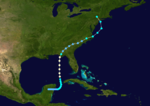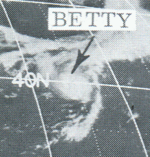1972 Atlantic hurricane season
| 1972 Atlantic hurricane season | |
|---|---|

Season summary map
|
|
| Seasonal boundaries | |
| First system formed | May 23, 1972 |
| Last system dissipated | November 7, 1972 |
| Strongest storm | |
| Name | Betty |
| • Maximum winds | 105 mph (165 km/h) (1-minute sustained) |
| • Lowest pressure | 976 mbar (hPa; 28.82 inHg) |
| Seasonal statistics | |
| Total depressions | 19 |
| Total storms | 7 |
| Hurricanes | 3 |
| Total fatalities | 137 |
| Total damage | $2.1 billion (1972 USD) |
| Related article | |
| Subtropical storm (SSHWS) | |
| Duration | May 23 – May 29 |
|---|---|
| Peak intensity | 70 mph (110 km/h) (1-min) 991 mbar (hPa) |
| Category 1 hurricane (SSHWS) | |
| Duration | June 14 – June 23 |
|---|---|
| Peak intensity | 85 mph (140 km/h) (1-min) 977 mbar (hPa) |
| Category 2 hurricane (SSHWS) | |
| Duration | August 22 – September 1 |
|---|---|
| Peak intensity | 105 mph (165 km/h) (1-min) 976 mbar (hPa) |
| Tropical storm (SSHWS) | |
| Duration | August 29 – September 3 |
|---|---|
| Peak intensity | 70 mph (110 km/h) (1-min) 993 mbar (hPa) |
| Category 1 hurricane (SSHWS) | |
| Duration | September 5 – September 14 |
|---|---|
| Peak intensity | 80 mph (130 km/h) (1-min) 997 mbar (hPa) |
| Subtropical storm (SSHWS) | |
| Duration | September 19 – September 21 |
|---|---|
| Peak intensity | 65 mph (100 km/h) (1-min) 996 mbar (hPa) |
| Subtropical storm (SSHWS) | |
| Duration | November 1 – November 7 |
|---|---|
| Peak intensity | 45 mph (75 km/h) (1-min) 1001 mbar (hPa) |
The 1972 Atlantic hurricane season had only four fully tropical named storms – the fewest since 1930. It officially began on June 1, 1972, and lasted until November 30, 1972. These dates conventionally delimit the period of each year when most tropical cyclones form in the Atlantic basin. The first storm, Subtropical Storm Alpha, developed on May 23 off the Southeast United States and struck Florida, causing minor damage and two fatalities. Although several other tropical depressions developed, only Tropical Depression Five is known to have affected land.
The most significant storm of the season was Hurricane Agnes, which at the time was the costliest United States hurricane, until Frederic in 1979. After brushing the western tip of Cuba, the hurricane made landfall on the Florida Panhandle. It caused at least $2.1 billion (1972 USD) in damage and 137 fatalities, mostly from inland flooding in Pennsylvania and New York. The strongest hurricane of the season was Betty, which reached peak winds of 105 mph (165 km/h) while west of the Azores. Tropical Storm Carrie passed just offshore of Massachusetts, causing heavy rainfall and resulting in four fatalities, but leaving only $1.78 million in damage.
The remaining tropical systems – Dawn, Charlie, and Delta – caused no significant effects on land. A strong El Niño kept hurricane activity at a minimum, with only four tropical storms, three subtropical storms, and three hurricanes. It was also one of only five hurricane seasons since 1944 to have no major hurricanes – the other years being 1968, the 1986, 1994, and 2013. In addition, the season was the first to name subtropical storms, using the Phonetic Alphabet, rather than the standard naming list. Collectively, the storms of the 1972 Atlantic hurricane season resulted in 137 deaths and over $2.1 billion in damage.
...
Wikipedia














